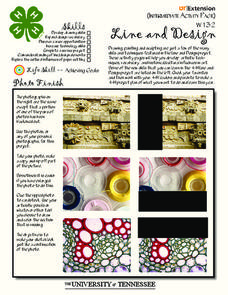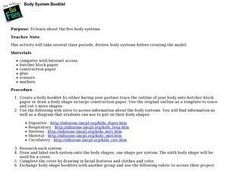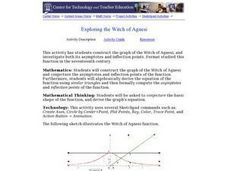Curated OER
Meteors and Meteorites
Students create Earth boxes containing some of Earth's biomes--desert, forest, tundra, ocean, and mountains. They simulate Earth's encounter with a comet trail and the resulting meteor shower. They present their Earth boxes to...
Curated OER
Angles in Art Lesson
Students examine the correlation between art and math. Using their computers, students construct and measure angles. Students identify the properties of angles and polygons. They engage in the Angles program on their Palm and use the...
Curated OER
Line and Design
With photography as the focus, students learn about line and design. Learners take pictures, and use the photos as a means to analyze artistic elements.
Curated OER
How are Seeds the Same and Different?
Students examine seeds from various plants. For this science lesson, students cut open fruits and vegetables in order to see the seeds. Students describe each type of seed and classify the seeds.
Curated OER
Protists - The Protozoans
Five pages provide thorough coverage of three protozoans: euglena, amoebae, and paramecia. For each, junior biologists read factual text, label the organism, and write answers to several questions. This neatly organized assignment is...
Curated OER
Exploring Countries and Cultures
Fifth graders choose a country associated with a family member and research its location, government, language, economy, history, holidays, foods, sports, and famous people. They write to inform using this data and draw a map identifying...
Curated OER
Bubble and Boyle
Even middle schoolers still enjoy experimenting with bubbles! They execute a series of experiments enabling them to distinguish between convex and concave surfaces, explore the properties of buoyancy, surface tension, and density,...
Curated OER
Important Arkansas People
Famous people in the history of Arkansas are the focus of a history instructional activity for kindergartners. Pupils identify important Arkansas citizens, such as President Bill Clinton. They create an illustrated poem that features...
IBM
The Human Body
Every moment, the systems in your body are working together to keep you breathing, standing, and thinking. Elementary schoolers explore the human body and its systems with an impressive, 15-page lesson plan that should leave your...
Curated OER
"Finding Your Sweet Tooth"--An Introduction to the Dichotomous Key
Sixth graders classify candy according to observable characteristics. They use a dichotomous key to identify their bag of "treats." Thus, describe how dichotomous keys help to the identifying of organisms. Design a self-generated...
Curated OER
Making a Body System Booklet
Students create a body booklet by having their partner trace the outline of their body onto butcher-block paper.
Curated OER
Sand and Water
Students follow this recipe for fun clay creations. In this early childhood art and science lesson, students develop creative-thinking skills, fine-motor skills, and sensory awareness while they make, mold, and decorate salt dough.
Curated OER
Which Bear?
Students study bears. For this science lesson, students compare black, grizzly and polar bears. Students measure the bear tracks and compare the bear habitats and diet.
Curated OER
America's Civil Rights Movement, Cubing
Students explore cubing as a graphic organizer to better explain the key concepts of the Civil Rights Movement and take positions on key concepts regarding the Movement.
Curated OER
That's Not Fair!
Young scholars complete an art project with either great or mediocre supplies and discuss how fair it was that they got the supplies they got. In this fairness lesson plan, students are given supplies by their teacher and discuss how...
Curated OER
Exploring the Witch of Agnesi
students construct the graph of the Witch of Agnesi, and investigate both its asymptotes and inflection points. They construct the graph of the Witch of Agnesi and conjecture the asymptotes and inflection points of the function. ...
Curated OER
Butterfly Adventure
Students in second grade are paired with fifth grade computer research buddies. They observe the characteristics of caterpillars, and identify the four stages of the caterpillar to butterfly life cycle. They graph the number of...
Curated OER
Visual Arts- Planetary Travel Brochure
Students research the planets and create a "travel brochure." In this space science instructional activity, students read the book Magic School Bus: Lost in Space and identify various properties of each planet. Students create a brochure...
Curated OER
Basic Mapping Skills
Establish and study the parts of a map with your class and, then they will work in small groups to create their own detailed map, including a legend. There are specific instructions to follow on what needs to be included.
Curated OER
Problem Solving
Second graders practice problem solving strategies. In this problem solving lesson, 2nd graders use strategies such as guess and check, acting out, drawing pictures and looking for patterns to solve problems. Students work in groups to...
Curated OER
Express Yourself
First graders identify details that make reading and writing more interesting. They classify events, people, places, and things and attach specific characteristics to each one. Everyone generates describing words on a worksheet that's...
Missoula Art Museum
Dance with Your Fingers, Draw with Your Toes
Pair dancing, music, and art into one elementary lesson. Using the work of Henri Matisse and Rudy Autio as inspiration, kids spend a few days listening to music that fits the moods of various pieces of art, then work on their own...
Center for Learning in Action
Introduction to Matter
Begin your states of matter lessons with a demonstration designed to introduce the concept that all matter has properties. Reinforce this concept through vocabulary exploration, and the creation of atom models; salt, water, and carbon...
Curated OER
My Own Backyard
Students explore and react to the painting The Road to Santa Fe. For this interacting with art lesson, students locate various objects in the painting. Students copy the angle of objects by using their bodies. Students...























